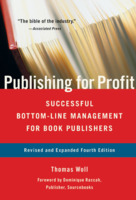
RATING: 5/10…ADDED AUGUST 30, 2014
A basic book outlying creating a small publishing company.
Notes:
It’s not the number of new books you publish that’s important, but the quality and consistency with which they are published. That’s the key! If your budget limits you to only two books per year, that’s fine, as long as you continue to publish that number each year. That way your reps, distributors, wholesale buyers, and retail buyers begin to know you—and begin to understand your publishing program.
In its simplest definition, the essence of the book publishing process is to create a profit by disseminating information.
The Thanksgiving to Christmas holiday period is, for most retailers, the busiest time of the year. It accounts in some cases for two-thirds of the year’s revenue. Other holidays and seasonal events throughout the year also generate sales, especially Valentine’s Day, Mother’s Day, Father’s Day, and Back to School promotions.
In what subjects will your company specialize? Why? What makes your books unique within the market? Do you have particular expertise within this market? Do you know who the expert authors are? Can you reach them? Who are your competitors within this subject category? What stores carry the kind(s) of books you’ll publish? Where in the store is the category placed?
What are the attributes of competitive books? Size Price points Hardcover or paperback Number of pages Use of color
What is the average number of copies sold within this category? If you sell that many, will your profitability goals be met? If not, what variables must change to achieve profitability? If not, how many new books will you have to sell to be profitable? How many new titles within the category are published seasonally? Are sales in the category expanding or are they contracting? How will you distinguish those titles you plan to publish?
You must be able to articulate your niche clearly with a short sentence or two.
If you go into a bookstore and browse the shelves, most books stand out as individual titles, not as a part of a series that’s identified by a particular image or brand name. The greatest brand identification—whether by publisher’s brand name or by product brand name—exists in two categories: travel books, where many series are identified by the publisher’s name (Frommer’s, Michelin, Baedeker, Passport) and children’s books, where many series are identified by the author’s name, which itself has become a brand name (Dr. Seuss, Beverly Cleary, Stephenie Meyer).
First, talk to those already established in the publishing business: publishers, editors, sales managers of publishing companies. Talk to retail book buyers, librarians (your local library is an excellent place to get firsthand information), and others. Now is not the time to be shy. Ask them What books sell best or are asked for most? What books do they find sell the best over long periods of time? What books and subjects do customers continually request? What categories are over-published, and which could use additional support? Who are the dominant publishers within the category? What makes their products so appealing?
The mission statement consists of at least four parts: a clear statement of your organization’s editorial goals a definition of your niche within the competitive marketplace your definition of the market a commitment to your goals
In my experience, one of the most overlooked aspects of any personnel decision is to hire someone with common sense and drive. These two attributes can make up for a lot of inexperience—and are very hard to find together. If you delegate decision-making authority, you will have more time to accomplish what you need to get done.
If, as we grow, the owners and managers understand that our growth comes from selling more books than we did before, or selling the same number of books at higher prices, or reducing our expenses, or a combination of these, then growth demands more of our resources be put into inventory and receivables.
In short, you must manage to increase your operating profit and decrease your taxes. This is why you need a wise financial team, which is an absolute must for every publisher.
